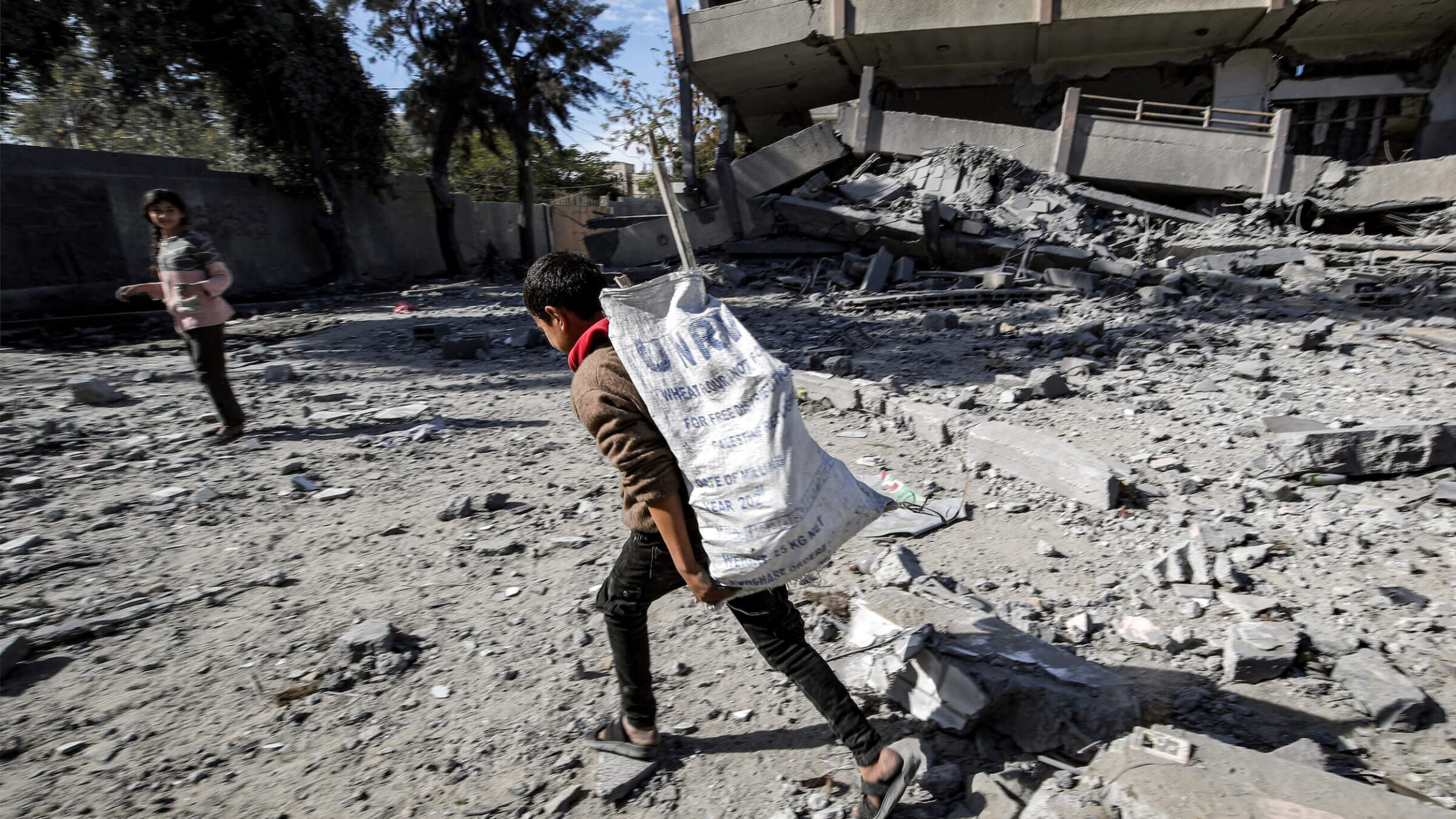UNRWA must be phased out. But right now, Israel’s interests depend on it
The beleaguered UN agency serves an important strategic function for Israel — and must continue to do so through this war

A boy carries a sack bearing the logo of the United Nations Relief and Works Agency for Palestine Refugees in the Near East (UNRWA), filled with salvaged items from the rubble of a destroyed high school in the Nuseirat camp for Palestinian refugees, which was severely damaged by Israeli bombardment on Feb. 1. Photo by Anas Baba/AFP
UNRWA, the often-controversial United Nations agency responsible for providing services to Palestinian refugees and their descendants, is back in the crosshairs.
A new Israeli intelligence report on the alleged involvement of 12 UNRWA employees in the Oct. 7 attack is damning. Nine Western nations — including the United States and Germany, UNRWA’s largest donors — have suspended their funding in response. The Wall Street Journal has reported that about 1,200 of UNRWA’s 12,000 employees in the Strip have ties to Hamas or Islamic Jihad. (The nature of those links remains unclear.) At least 190 UNRWA workers are alleged by Israel to be operatives of Hamas or Palestinian Islamic Jihad.
UNRWA is an anachronistic organization whose flaws run deep, most notably when it comes to its hereditary refugee definition, which allows millions to remain perpetually reliant on international aid, even under non-crisis circumstances.
As the U.S., the Arab world, and the international community consider how to advance a better future in the Middle East in the wake of this war, their plans must include phasing out UNRWA’s wide-ranging responsibilities in Gaza — including health care and education — and transitioning them to a Palestinian government.
If Palestinians are to have a credible horizon for statehood alongside Israel, Palestinians living in Palestinian territories who are descendants of refugees from 1948 cannot continue maintaining refugee status. UNRWA’s role in perpetuating the notion that millions of Palestinians can only achieve a just future by returning to what is today Israel is counterproductive to the vision of two states for two peoples.
But as Gazans face a humanitarian catastrophe, calls to defund UNRWA promptly and permanently are deeply misguided — not just on a moral level, but on a strategic one. For now, maintaining UNRWA is the path least harmful to Israel’s interests.
Mitigating Gaza’s chronic crises
Even Israeli officials acknowledge that UNRWA remains, for the time being, indispensable: Without its services, the humanitarian crisis in Gaza might reach a pitch that would require the halting of the war. Post-war, Israel’s desire to preclude a Hamas resurgence means it must ensure that humanitarian needs are met amid the reconstruction. UNRWA is the only group that currently has the knowledge and infrastructure to do so in the immediate term.
Dire economic conditions, exacerbated by Hamas’ diversion of funds away from civilian needs to bolster its terror operations, have made Gaza reliant on UNRWA for food aid, clean drinking water and infrastructure maintenance and reconstruction.
With the current war now causing unprecedented destruction and displacement, this reliance has never been greater. As of early January, UNRWA was providing food and shelter to 1.8 million people. On his visit to the U.S. this week, the head of Israel’s Coordinator of Government Activities in the Territories, Maj. Gen. Ghassan Aliyan, reportedly expressed this point to Biden administration officials.
The agency has signaled that international suspension of funds could halt its operations entirely after one month, an outcome that would further destabilize the situation on the ground, leaving Israel legally and practically responsible for providing services to a destitute and likely hostile population numbering in the millions.
That responsibility would pose a tremendous economic, military, and political burden. It would almost certainly jeopardize Israel’s short- and long-term strategies for achieving success in its war aims.
Since the war began, there have been regular reports of Hamas co-opting UNRWA personnel and resources. A released Israeli hostage claimed to have been held hostage by an UNRWA teacher. The IDF has said that it’s found weapons and ammunition in UNRWA buildings and containers and in tunnels used for military purposes underneath UNRWA schools.
Hamas is endemic to Gaza and has shaped every aspect of life there for over 15 years. The movement permeates the local population, including UNRWA staffers, and even in the event of Israel’s victory, the country could be dealing with residual cells of Hamas insurgents for years.
In the short term, this problem should be addressed by targeting individual terror operatives, not collapsing a corrupted yet temporarily irreplaceable humanitarian agency.
Israel’s humanitarian tradeoff
Shortly after Oct. 7, UNRWA posted and deleted a tweet alleging that Hamas had stolen fuel and medical supplies from its facilities. In a territory dominated by a terror organization, it is safe to assume that well-intentioned aid regularly falls into the wrong hands, whether delivered by UNRWA or others.
But the potential damage Israel might face due to Hamas’ laying claim to UNRWA resources pales in comparison to the damage Israel would face internationally if this war devolved into an even greater humanitarian tragedy.
Legitimately or not, accusations that Israel is engaging in collective punishment or genocide would only grow louder. If Israel plans to rely on the Arab world to help it rebuild Gaza, as Prime Minister Benjamin Netanyahu has suggested it does, it cannot afford to give greater weight to this narrative, which is already particularly dominant among the Arab public.
On a strategic level, Israel needs to demonstrate that it is taking humanitarian concerns seriously. For now, it cannot do so without UNRWA.
As my Israel Policy Forum colleagues Shira Efron and Michael Koplow explained in a recent study outlining U.S. policy options for a post-Hamas Gaza, the right approach to fixing the rampant issues with UNRWA would be to implement more comprehensive oversight mechanisms over the agency and gradually limit its responsibilities. UNRWA’s funding and mandate — currently temporary — need to be conditioned on meaningful reforms, and tied to people’s current needs rather than their inherited political status as descendants of refugees from 1948.
Israel, the U.S., and the Arab world should work to transition UNRWA’s responsibilities to other international aid organizations and, eventually, a Palestinian government, ideally run by the Palestinian Authority. An eventual two-state outcome requires ensuring that Palestinians living in Palestine are no longer treated as refugees from what is today Israel.
Meanwhile, as Gaza’s education system is eventually rebuilt, the international community will have an opportunity to ensure that textbooks and curricula do not glorify and incite terrorism, as is currently the case both in UNRWA schools and throughout the Palestinian territories.
But the immediate problem — Hamas’ rule in Gaza — must be addressed without creating additional ones. Defunding UNRWA rapidly and without a plan in place only puts a better future for all further out of reach.






















